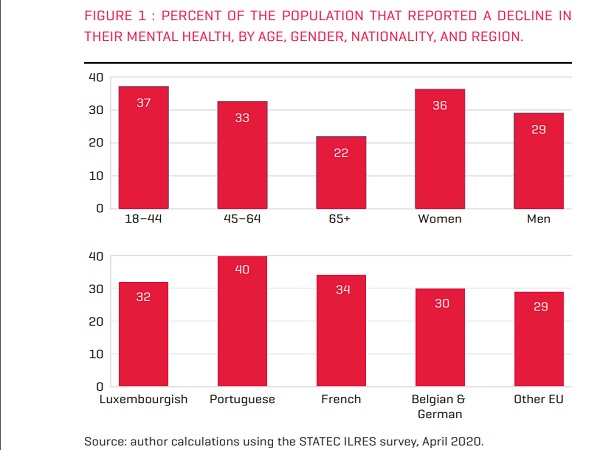 Credit: STATEC
Credit: STATEC
STATEC recently conducted a national survey on the social and economic impact of COVID-19 in Luxembourg in collaboration with TNS Ilres.
The coronavirus pandemic and fight against it has had significant collateral effects on mental health. Based on recently collected data by STATEC, one in three Luxembourg residents reported a decline in their mental health, which is more than double the corresponding decline in physical health. Such psychological effects were often ignored during the initial stages of the pandemic. Yet, as countries gain some control over the contagion, they have expanded their focus in hopes of addressing these issues. To that end, STATEC has examined plausible causes of mental distress during the period of lockdown in Luxembourg
Regarding employment, 6.4% of the respondents reported being furloughed due to COVID-19 under the partial unemployment scheme. A further 2.7% are unemployed, and about one quarter (24.7%) believe their job security will worsen in the future. Each group is likely to experience lower well-being, yet these figures suggest the employment consequences of the pandemic have actually been less severe in Luxembourg than in other countries, such as the United States. However, unemployment remained a concern as one of the most important factors contributing to people’s feelings of well-being and mental health. Even employed people have been affected, with the fear of job loss and becoming unemployed negatively affecting well-being.
Declines in income have also been attributed as a likely source of distress. Indeed, scholars have found that income losses have larger effects on people’s well-being than equivalent income gains. In Luxembourg, 16% of the population experienced declines in income. The main reported causes of income loss were the loss of employment (21%), the reduction of working hours (24%), lower wages or business profits (21%) and "other" or "multiple" causes (35%). On the other hand, nearly 60% of individuals reported a decrease in their expenses, whilst 16% of people incurred increased expenses.
Working conditions also radically changed following the outbreak. At the time of the survey in April 2020, nearly 50% of the workforce worked from home, while another 21% alternated between home and their employer’s premises. Regarding the impact of teleworking on well-being, the majority of people (55%) enjoyed working from home, while approximately 15% did not and the remaining 30% neither liked nor disliked it.
Regarding the demographics of respondents reporting a negative impact on their mental health, young people were most affected. Among those aged 18-44, about 37% reported that their mental health had deteriorated. This figure decreased for each age group: among the 65 and over age group, only 22% saw their mental health deteriorate. Compared to men, more women experienced worsening mental health. Across nationalities, the Portuguese fared the worst (40% experienced a decline in mental health), while those from other EU countries fared best. Across regions in Luxembourg, the largest declines occurred in the south and Luxembourg City, with respectively 35 and 34% of residents saying that their mental health declined. The best regional performer was central Luxembourg, outside of the capital, with a decline of 28%.
The most important factors associated with the decline in mental health were physical health, income and employment characteristics. Someone who experienced a decline in their physical health was about 35% more likely to also experience a decline in their mental health. Similarly, if an individual’s revenue decreased or expenses increased, they were more likely to report a decline, at about 5% and 9% respectively. Other factors may also explain why people experienced declines in their mental health.
STATEC recalled that it is difficult to measure the impacts of lockdown and that it solely assessed the short-term impacts of the pandemic. The full report (in English) can be downloaded from https://statistiques.public.lu/catalogue-publications/regards/2020/PDF-08-2020.pdf.








